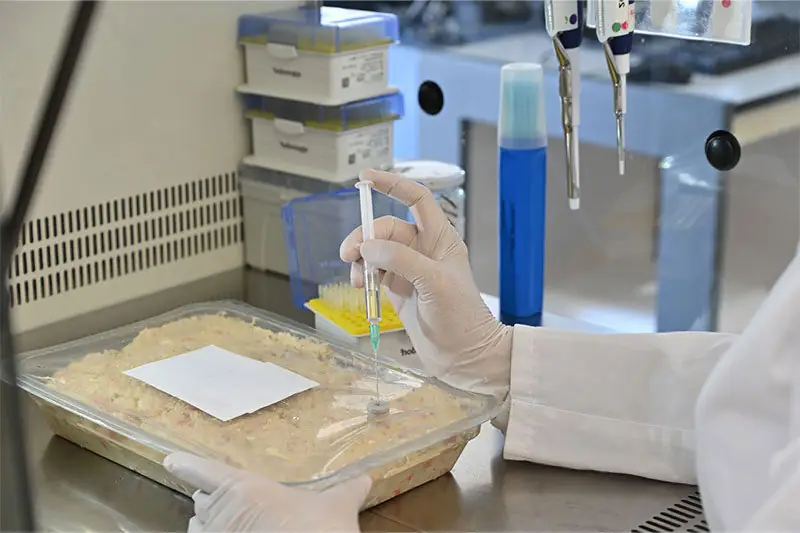EN 12353 Preservation Efficacy Testing for Cosmetics
The European Standard EN 12353 is a pivotal regulatory guideline that ensures the microbiological safety of cosmetic products. This testing procedure evaluates the effectiveness of preservatives in preventing microbial growth, which can lead to spoilage or contamination, compromising product quality and consumer health.
Preservative efficacy tests are critical for ensuring compliance with international standards such as those set by the International Organization for Standardization (ISO) and the European Union. These tests are mandatory for all cosmetic products sold within the EU market, thereby mandating their inclusion in a manufacturer's quality assurance program.
The procedure outlined in EN 12353 involves inoculating samples of the cosmetic product with various microorganisms that are commonly found on skin or in contact with cosmetics. The sample is then incubated under conditions designed to promote microbial growth, and its stability is assessed over a specified period. The test aims to determine whether the preservative system employed can inhibit microbial proliferation effectively.
The significance of this testing cannot be overstated; it ensures that consumers are protected against potential health risks associated with microbial contamination in cosmetics. By adhering to EN 12353, manufacturers demonstrate their commitment to producing safe and reliable products.
- Microbial contaminants can lead to a range of adverse effects including skin irritation, allergic reactions, and infections.
- Ineffective preservative systems may result in the spread of harmful pathogens, potentially causing serious health issues.
- The results of EN 12353 tests provide critical data that informs product development and formulation decisions, enhancing overall safety standards.
Compliance with this standard is not just a regulatory requirement but also reflects a broader commitment to consumer welfare. By ensuring the microbiological stability of cosmetics, manufacturers uphold their responsibility towards public health.
The testing process typically involves several key steps:
- Sample preparation: The cosmetic product must be prepared according to specific guidelines provided in EN 12353.
- Inoculation: Microorganisms are introduced into the sample under controlled conditions.
- Incubation: Samples are incubated for a predefined period, allowing sufficient time for potential microbial activity to occur.
- Evaluation: The presence or absence of microbial growth is assessed visually and through microbiological techniques.
The results of these tests are crucial in validating the efficacy of preservative systems. They provide insights into whether the chosen preservatives can effectively control microbial contamination, ensuring that products remain safe for use.
For quality managers and compliance officers, understanding EN 12353 is essential as it underpins their efforts to maintain product safety and regulatory adherence. Compliance with this standard ensures that manufacturers meet stringent EU regulations, thereby safeguarding consumer health and protecting the reputation of cosmetic brands.
Benefits
The benefits of adhering to EN 12353 are numerous and far-reaching:
- Enhanced Safety: Ensures that cosmetics do not harbor harmful microorganisms, thus reducing the risk of contamination and associated health hazards.
- Regulatory Compliance: Helps manufacturers meet stringent EU regulations regarding cosmetic safety, thereby avoiding legal penalties and maintaining a positive market reputation.
- Better Product Quality: By ensuring microbial stability, EN 12353 contributes to the overall quality of cosmetic products, enhancing consumer satisfaction.
- Informed Decision-Making: The results provide valuable data that can guide future product development and formulation decisions, leading to safer and more effective products.
Compliance with EN 12353 not only ensures regulatory compliance but also enhances the safety and quality of cosmetic products. This is particularly important in sectors where consumer health and well-being are paramount.
R&D engineers can leverage these test results to refine preservative systems, leading to improved product performance. Compliance officers benefit from a streamlined process for ensuring that all products meet necessary standards before market release, while procurement teams can ensure the quality of raw materials used in the formulation process.
Quality and Reliability Assurance
The laboratory adheres to strict protocols when conducting EN 12353 tests. Quality assurance is a cornerstone of our operations, ensuring that every test conducted meets the highest standards of accuracy and reliability.
We use state-of-the-art equipment and follow internationally recognized standards such as ISO 17025 for calibration and performance verification. Our team of experts ensures that each step of the testing process adheres to EN 12353 guidelines, providing clients with accurate and consistent results.
Our quality management system is designed to minimize errors and ensure repeatability in our tests. By maintaining meticulous records and conducting regular internal audits, we uphold the integrity of our results. This commitment to excellence is reflected in our ISO 14001:2015 certification for environmental management and ISO 9001:2015 certification for quality management.
Client satisfaction is at the heart of our operations. Our rigorous approach ensures that we deliver reliable and accurate results, which are critical for decision-making processes within client organizations. By adhering to these stringent protocols, we not only meet but exceed industry expectations, fostering long-term relationships with our clients.
Customer Impact and Satisfaction
The impact of EN 12353 compliance extends beyond regulatory requirements; it significantly enhances customer satisfaction by ensuring product safety and reliability. Customers can trust that the cosmetic products they use are free from harmful microbial contamination, promoting a safer and healthier environment.
- Health Protection: Ensured protection against potential health risks associated with microbial contamination in cosmetics.
- Consumer Trust: Builds consumer confidence by demonstrating commitment to product safety and regulatory compliance.
- Brand Reputation: Enhances brand reputation through consistent quality assurance, fostering loyalty among customers.
Compliance with EN 12353 not only protects consumers but also supports the broader objectives of protecting public health. By ensuring that all cosmetic products meet stringent safety standards, we contribute to a safer and healthier society.
The results of these tests are often shared directly with clients, providing them with valuable insights into product performance. This transparency fosters trust between the laboratory and its clients, reinforcing our commitment to excellence in every aspect of our work.





